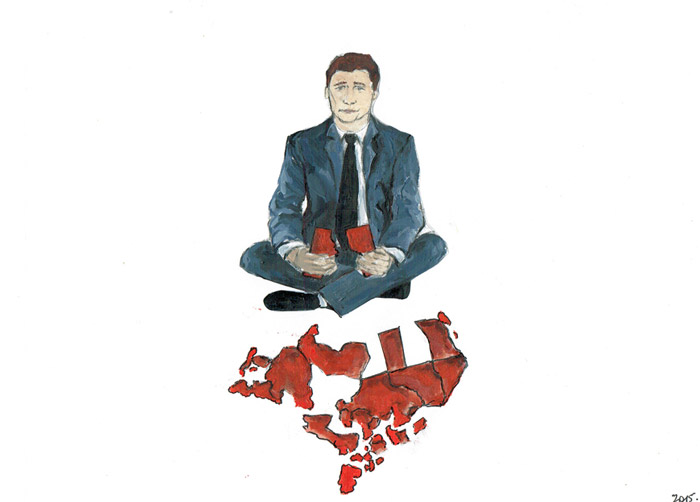Canada’s electoral system is in need of a reboot. It discourages people from voting by the simple fact that a majority government may be formed without a majority of the popular vote. Andrew Coyne, columnist for The National Post, summed the system up, saying that it sustains “false and exaggerated majorities, discriminates among voters, rewards regionally divisive parties,” and wastes votes. Fortunately, Prime Minister Justin Trudeau has promised that the 2015 federal election is the last under the first-past-the-post system.
Trudeau should set aside partisanship and strategy, even if it means having less power, to prove that he is committed to Canadians’ interests and to the improvement of democracy.
Although Trudeau’s promise of electoral reform is a good measure, it is not etched in stone. Politicians’ promises often fall through once in office for one reason or another, such as a realization regarding the logistics of a policy—as is the case with the Canadian government’s response to the refugee crisis—or conflicts and delays due to political partisanship. The fact that Trudeau won a majority government because of the flawed electoral system undoubtedly reduces his incentive to change the system. For two consecutive elections, Canadian parties have won majority governments with approximately 39 per cent of the popular vote. Since the Liberals have a majority government, one could say that more than 10 million Canadians’ votes were wasted on other parties. A system that includes greater proportional representation is needed.
If the Liberals do follow through with electoral reform, their plan to not hold a referendum on a new voting system is a good choice. Ensuring that the entire field of eligible voters is properly educated on a matter of this gravity and complexity would be a tall order. During the Ontario electoral reform referendum in 2007, 47 per cent of those polled said they knew nothing at all about the proposal, and only 12 per cent said they knew a lot. Although reform is often argued along partisan lines, reform itself should not be an ideological or partisan issue; it is simply reform for Canadians to be represented more effectively. Furthermore, Canadians who voted for the Liberals endorsed the campaign promise of all-party consultation as an alternative to holding a referendum. Any reform that is undertaken will thus be done in concert with the other parties. This plan to consult Canadians was confirmed by the Liberal House leader Dominic LeBlanc, who said that it has “always been [their] plan” and that there is no reason to think that’s been changed.
At this point, the Liberals could either sustain the current system by becoming complacent to change, implement an electoral system that could boost their dominance in Parliament, such as ranked ballots, or they could follow through with the all-party consultation. Without strong actions from the federal government to undertake electoral reform, the opposition parties, the media, and civil society must take the lead to push for reforms and monitor them closely. Rather than criticizing the Liberal party for not promising a referendum, there must be pressure to ensure that electoral reform is taken seriously by all those involved in the consultation. Voters must express their preferences to their Members of Parliament, and the debate must be vigorous beyond Parliament Hill. Media must emphasize the issue; Andrew Coyne’s column is one example of how this can be done, but other journalists and personalities must follow suit.
Electoral reform is ultimately a question of how equality will be defined in Canadian democracy. Thus, the particular machinations of the people in government, and the various power plays that may go into the reformed policy must be framed in terms of the overall goal. While the government must be held up to scrutiny, commentators, and citizens must bear in mind the ultimate objective—a system that is more representative, where all may participate fairly and equally.










All proportional representation does is enlarge the number of representatives making fascist laws that govern Canadians. Why is that? The number of radicals on the left, although fractured into several different groups would, under proportional representation, have the opportunity to enact laws that endanger western liberal views.
In addition, the Canadian Constitution is too weak to protect individuals from tyranny of the majority.
For example, elected Islamic representatives from numerous parties, could coalesce in Parliament to form a majority that could enact Sharia Law, spelling the end of Canada as a free nation. Sharia law, in some form or another, is now legal in the UK, Germany, Austria and many other European countries. In fact, the UK has more than 85 Sharia courts.
Our system is very fragile and Canadians must be protected from tyranny since the Constitution alone will not do it.
So true. In fact, that is why the single largest area of job growth in Great Britain is “hand amputator” and “stoner of adulterers.” Did you know that it is impossible to get a alcoholic drink in Britain these days? All those corner pubs, shuttered or turned into hummus joints. So sad.
What nonsense! Canada’s winner-take-all majorities have enpowered a handful of swing voters to the exclusion of the rest of Canadians for years.